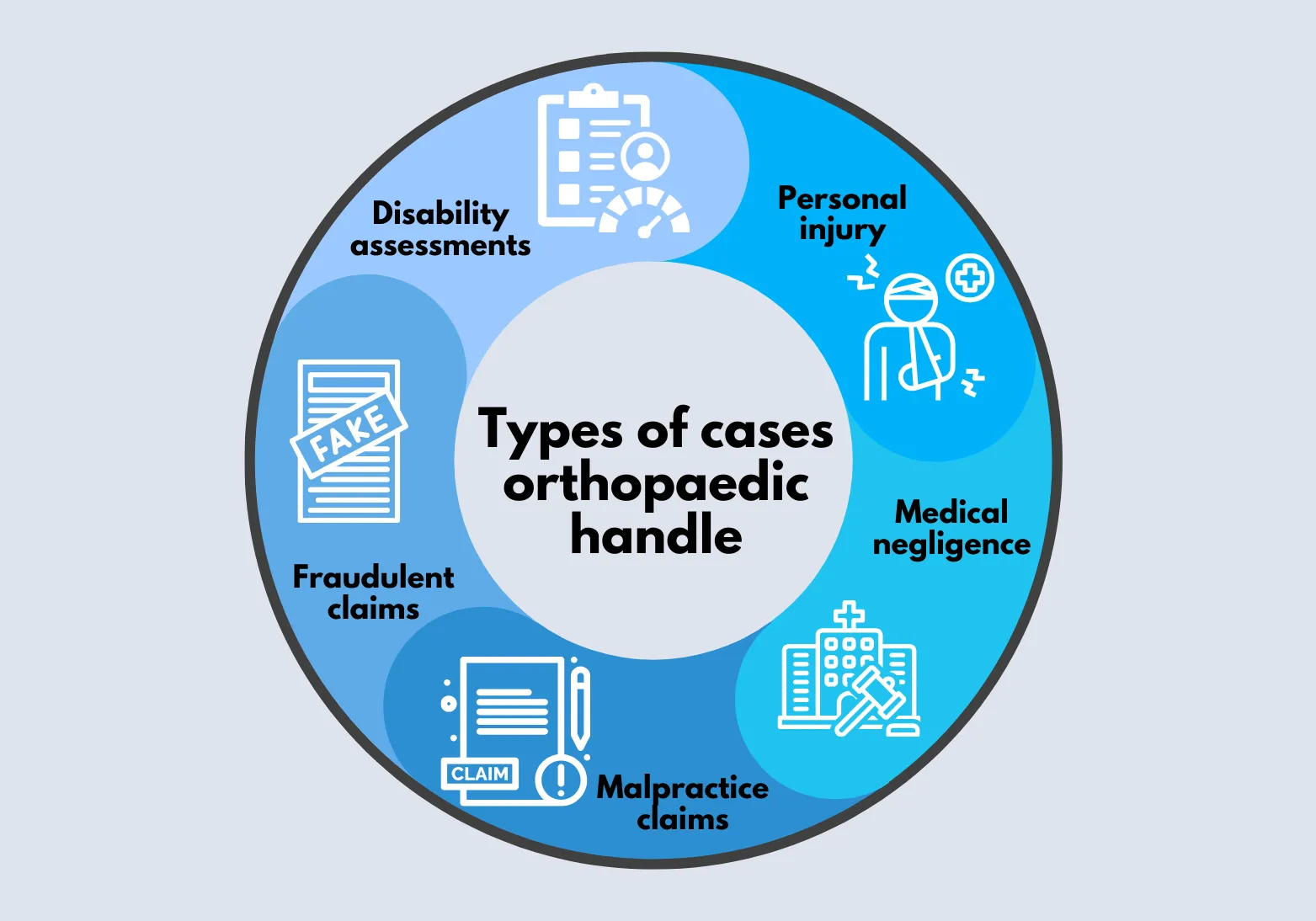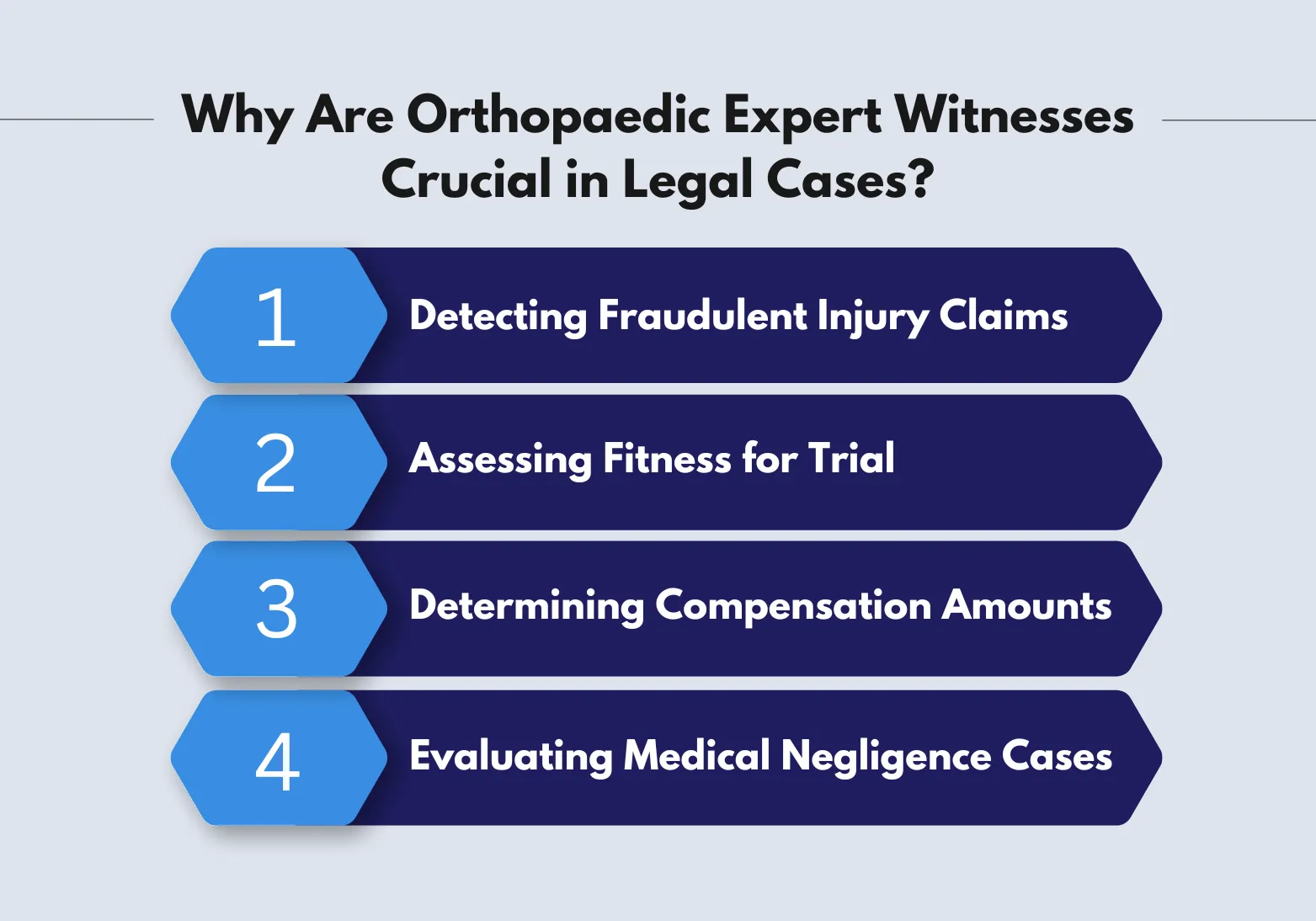TABLE OF CONTENT
- What is an Orthopaedic Expert Witness
- Types of Cases They Handle
- Role of an Orthopaedic Expert Witness
- Expertise in Diagnosis and Treatment
- Why Are Orthopaedic Expert Witnesses Crucial in Legal Cases?
- How the Process Works
- Increasing Demand for Orthopaedic Expert Witnesses
- Choosing the Right Orthopaedic Expert Witness
- FAQs
- What are the roles and responsibilities of an orthopaedic expert witness?
- What are the two main functions of orthopaedic expert witnesses?
- What are three important aspects of the testimony of an expert witness?
- How does an expert witness help in a legal case?
- How much does a private orthopaedic consultation cost in the UK?
When someone has a bone, joint, or muscle injury, the law often needs clear proof. An orthopaedic expert witness steps in to give that proof. They examine scans, reports, and test results. They write short, clear reports. Then they explain the facts in court in simple words. This helps judges and juries see the real story of pain, loss, and care needs. Their work makes sure each case is fair. As the Crown Prosecution Service guidance makes clear,
“Expert evidence is admissible to furnish the court with information which is likely to be outside the experience and the knowledge of a judge or jury.”
(Criminal Practice Directions 2023 7.1.1 Expert Evidence)
In the UK, 30% of GP consultations relate to musculoskeletal issues. Over 20 million people suffer from these conditions each year. Legal claims for these injuries are rising. This increases the need for expert testimony. This blog explains the role of an Orthopaedic Expert Witness. It shows what they do and why orthopaedic surgeon expert witnesses matter.
What is an Orthopaedic Expert Witness
An orthopaedic expert witness is a doctor trained in bones, joints, and muscles. They spend years in medical school and specialist training. They treat patients, read X‑rays, and study lab results. They form a view on how an injury began, how bad it is, and how it affects daily life. They turn medical details into plain speech for lawyers and judges. In court, they bridge the gap between medicine and law.
Types of Cases They Handle
An orthopaedic surgeon expert witness may work on:
Personal injury
After car crashes, falls, or sports hits.
Read more about personal injury experts in court cases.
Medical negligence
When scans are missed or surgery has errors.
Read more about medical negligence.
Malpractice claims
If care mistakes cause harm.
Fraudulent claims
To spot fake or overblown injuries.
Disability assessments
To judge long‑term care needs.
For each case, the orthopaedic surgeon expert witness studies the facts. They form a clear view. Then they help legal teams set strategy.

Role of an Orthopaedic Expert Witness
Providing Medical Opinions
An orthopaedic expert reviews patient history, scans, and notes. They note hidden damage and pain levels. They check future risks like arthritis. They write a short opinion. This guides lawyers and insurers on fair offers.
Assisting in Court Cases
In court, they speak in plain phrases. They explain injury details and life limits. They answer lawyer questions in easy terms. This makes complex science easy to follow.
Examining Causation and Liability
They decide if harm came from a fall, care error, or old pain. They look for signs of past injuries. They decide if a new event made it worse. Their view on cause and blame is key for fair pay.
Preparing Medico‑Legal Reports
A good report has:
- Injury details in plain words
- How movement and life quality changed
- Steps for recovery and rehab
- Clear treatment suggestions
These help judges grasp facts fast, whether they read a summary or the full text.
Get an expert medico-legal report tailored to your case.
Expertise in Diagnosis and Treatment
An orthopaedic expert does more than spot a broken bone. They:
- Find wear‑and‑tear like arthritis
- Spot bone thinning or early osteoporosis
- Check for infections after joint surgery
- Look for bone tumours or cysts
- Use tools like MRI, CT scans, or ultrasound
They may run simple clinic tests or order lab checks. Their findings can prove or shake up a claim.
Why Are Orthopaedic Expert Witnesses Crucial in Legal Cases?
Detecting Fraudulent Injury Claims
Fake injuries waste time and cash. An orthopaedic legal expert witness checks if scans match the pain claimed. They spot signs that the injury is too mild or too old.
Assessing Fitness for Trial
Some say they cannot go to court due to health. An expert reviews all data and may examine the person. Their report tells the judge if the person can join the trial.
Determining Compensation Amounts
Judges set awards by expert views of:
Medical Costs
surgeries, scans, therapy, aids
Loss of Income
Work days lost now and later
Long‑Term Care
Home help, therapy, home changes
Pain and Suffering
Daily pain, limits, emotional toll
Evaluating Medical Negligence Cases
They explain how a delayed scan or wrong surgery caused extra harm. They show how this affects daily life. Their view helps courts decide fair payouts.

How the Process Works
When a case begins, lawyers ask for an expert. The expert gets files and scans. They may meet the patient. They write a report in clear steps. They may join calls or video meetings. If the case goes to court, they give oral testimony. They answer questions from both sides. Their work can last weeks or just hours.
Increasing Demand for Orthopaedic Expert Witnesses
As NHS and private care improve, more people expect top treatment. When care fails, claims rise. Errors in surgery, scans, or treatment boost the need for an orthopaedic expert witness. Law firms report a 10% rise in new musculoskeletal claims each year. This shows why experts are in demand.
Choosing the Right Orthopaedic Expert Witness
Pick an expert with a strong track record. Check:
- Years in orthopaedic clinics and hospitals
- Simple, clear speech and writing
- Fair, fact‑based views
- Evidence of ongoing training
Read their CV and ask for sample reports. Talk to past clients if you can.
FAQs
When someone has a bone, joint, or muscle injury, the law often needs clear proof. An orthopaedic expert witness steps in to give that proof. They examine scans, reports, and test results. They write short, clear reports. Then they explain the facts in court in simple words. This helps judges and juries see the real story of pain, loss, and care needs. Their work makes sure each case is fair. As the Crown Prosecution Service guidance makes clear,
“Expert evidence is admissible to furnish the court with information which is likely to be outside the experience and the knowledge of a judge or jury.”
(Criminal Practice Directions 2023 7.1.1 Expert Evidence)
In the UK, 30% of GP consultations relate to musculoskeletal issues. Over 20 million people suffer from these conditions each year. Legal claims for these injuries are rising. This increases the need for expert testimony. This blog explains the role of an Orthopaedic Expert Witness. It shows what they do and why orthopaedic surgeon expert witnesses matter.
What is an Orthopaedic Expert Witness
An orthopaedic expert witness is a doctor trained in bones, joints, and muscles. They spend years in medical school and specialist training. They treat patients, read X‑rays, and study lab results. They form a view on how an injury began, how bad it is, and how it affects daily life. They turn medical details into plain speech for lawyers and judges. In court, they bridge the gap between medicine and law.
Types of Cases They Handle
An orthopaedic surgeon expert witness may work on:
Personal injury
After car crashes, falls, or sports hits.
Read more about personal injury experts in court cases.
Medical negligence
When scans are missed or surgery has errors.
Read more about medical negligence.
Malpractice claims
If care mistakes cause harm.
Fraudulent claims
To spot fake or overblown injuries.
Disability assessments
To judge long‑term care needs.
For each case, the orthopaedic surgeon expert witness studies the facts. They form a clear view. Then they help legal teams set strategy.

Role of an Orthopaedic Expert Witness
Providing Medical Opinions
An orthopaedic expert reviews patient history, scans, and notes. They note hidden damage and pain levels. They check future risks like arthritis. They write a short opinion. This guides lawyers and insurers on fair offers.
Assisting in Court Cases
In court, they speak in plain phrases. They explain injury details and life limits. They answer lawyer questions in easy terms. This makes complex science easy to follow.
Examining Causation and Liability
They decide if harm came from a fall, care error, or old pain. They look for signs of past injuries. They decide if a new event made it worse. Their view on cause and blame is key for fair pay.
Preparing Medico‑Legal Reports
A good report has:
- Injury details in plain words
- How movement and life quality changed
- Steps for recovery and rehab
- Clear treatment suggestions
These help judges grasp facts fast, whether they read a summary or the full text.
Get an expert medico-legal report tailored to your case.
Expertise in Diagnosis and Treatment
An orthopaedic expert does more than spot a broken bone. They:
- Find wear‑and‑tear like arthritis
- Spot bone thinning or early osteoporosis
- Check for infections after joint surgery
- Look for bone tumours or cysts
- Use tools like MRI, CT scans, or ultrasound
They may run simple clinic tests or order lab checks. Their findings can prove or shake up a claim.
Why Are Orthopaedic Expert Witnesses Crucial in Legal Cases?
Detecting Fraudulent Injury Claims
Fake injuries waste time and cash. An orthopaedic legal expert witness checks if scans match the pain claimed. They spot signs that the injury is too mild or too old.
Assessing Fitness for Trial
Some say they cannot go to court due to health. An expert reviews all data and may examine the person. Their report tells the judge if the person can join the trial.
Determining Compensation Amounts
Judges set awards by expert views of:
Medical Costs
surgeries, scans, therapy, aids
Loss of Income
Work days lost now and later
Long‑Term Care
Home help, therapy, home changes
Pain and Suffering
Daily pain, limits, emotional toll
Evaluating Medical Negligence Cases
They explain how a delayed scan or wrong surgery caused extra harm. They show how this affects daily life. Their view helps courts decide fair payouts.

How the Process Works
When a case begins, lawyers ask for an expert. The expert gets files and scans. They may meet the patient. They write a report in clear steps. They may join calls or video meetings. If the case goes to court, they give oral testimony. They answer questions from both sides. Their work can last weeks or just hours.
Increasing Demand for Orthopaedic Expert Witnesses
As NHS and private care improve, more people expect top treatment. When care fails, claims rise. Errors in surgery, scans, or treatment boost the need for an orthopaedic expert witness. Law firms report a 10% rise in new musculoskeletal claims each year. This shows why experts are in demand.
Choosing the Right Orthopaedic Expert Witness
Pick an expert with a strong track record. Check:
- Years in orthopaedic clinics and hospitals
- Simple, clear speech and writing
- Fair, fact‑based views
- Evidence of ongoing training
Read their CV and ask for sample reports. Talk to past clients if you can.




